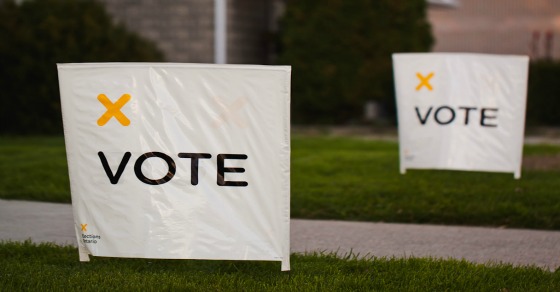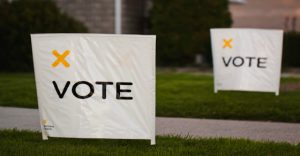
Here are all the times the Conservatives changed election rules without a referendum
People who live in glass houses...
People who live in glass houses…
The Conservatives continue to insist that any change to Canada’s electoral system requires a referendum.
“When you change the rules of democracy, everyone gets to have a say”, says interim leader Rona Ambrose. “If the Liberals want to make a fundamental change to our country’s voting system, the process must not be dominated by one political party’s interests.”
Let’s review all the times the Conservatives changed the rules of Canadian democracy without a referendum, shall we?
Fixing election dates
In May 2007, the Conservatives passed Bill C-16 which fixed future Canadian elections to the third Monday of October every four years. (Barely a year later, the Conservatives broke the spirit of their own law by calling an election for October 14, 2008).
Eliminating the per vote subsidy
After winning a majority in 2011, the Conservatives introduced the “Keeping Canada’s Economy and Jobs Growing Act”, slipping in changes to the Elections Act that eliminated Canada’s per-vote subsidy which awarded parties $2 for every vote they received.
Critics were quick to point out that opposition parties stood to lose the most from the change.
Adding seats to the House of Commons
Bill C-20, passed in December 2011, legislated a new formula for determining the number of MPs each province would get and the House of Commons grew from 308 to 338 seats.
At the time, critics worried that the new seats would mostly appear in Conservative strongholds.
The Unfair Elections Act
When it comes to changing Canadian democracy without consulting people, this one takes the cake.
The Orwellian “Fair Elections Act” represented a significant overhaul of the way Canadian elections would be run. Its changes were extensive, but here are a few, um, highlights:
-
Elections Canada was forbidden to run adds encouraging people to vote or distribute kits to schoolchildren designed to educate them about democracy and voting
-
The annual amount candidates and leadership contestants were permitted to donate to themselves was increased from $1,000 to $5,000 and $25,000 respectively
-
The personal annual contribution limit to candidates and parties was increased from $1,000 to $1,500
-
The spending limit for parties in elections was increased
-
Voter registration cards would no longer be considered appropriate ID at polling stations and vouching would be eliminated
Critics pointed out that the changes to ID rules in particular would make it more difficult for First Nations, youth, and people living in poverty to vote.
The Conservatives not only failed to consult Elections Canada but rammed the bill through Parliament without serious debate.
How quickly some things are forgotten…
Photo: Sharon Drummond. Licensed under a Creative Commons BY-NC-SA 2.0 license.
Our journalism is powered by readers like you.
We’re an award-winning non-profit news organization that covers topics like social and economic inequality, big business and labour, and right-wing extremism.
Help us build so we can bring to light stories that don’t get the attention they deserve from Canada’s big corporate media outlets.
Donate




